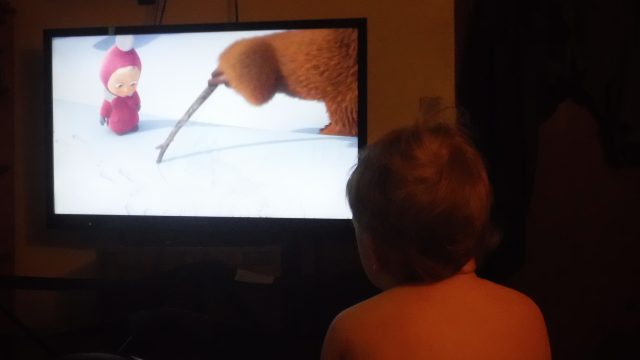The first time we watched Masha and the Bear, it was in Russian and we’d found it on YouTube. Having it on Netflix in English was much nicer. It’s one of those shows that most of the parents I know of children my kids’ age can talk about at length; my boyfriend’s mother and I used to grumble together about how much we thought Bear deserved better than Girl Bear. Indeed, someone I know said she didn’t let her kid watch it because Masha is such a hellion, but I said we talked a lot in our household about why she was being bad and how not to be like her.
Masha is a small blonde girl who lives in a disused railway station in the Siberian wilderness. She is the only human in the forest for the most part. However, there is a rabbit and a few farm animals and hedgehogs and squirrels and a pair of hungry wolves. And Bear, who lives in a quite cozy little house. In the first episode, he is feeling peaceful—he’s got his samovar and his bee hives and his books. He is, in fact, a retired circus bear. And Masha, who seems to be about three, makes his life very difficult indeed.
Indeed, most of the trouble in the forest is caused by Masha’s being three with the expected complete disregard of a child her age for anything but herself. She is not a malicious child, for the most part. Indeed, there are several episodes where we see her going out of her way to be nice to people. It’s just that, you know, when the animals all hide in the beginning of the first episode, they’re not wrong to do so. Chaos definitely follows in her wake. The more so because she is a small child living completely without parents.
Not that Bear is a bad father figure for her in a lot of ways. He does have genuine affection for her much of the time, except when she’s driving him crazy and dropping trees on him and so forth. He teaches her to read, even. But the fact remains that he is, after all, a bear. And not a talking bear—the only person in the forest who talks in most episodes is Masha herself. And she doesn’t live with him; he takes care of her much of the time, but he has no actual obligation to do so.
Also, Bear is persistently trying to court Girl Bear, who is also being courted by Bro Bear. In the opinion of just about everyone I know who’s seen this show, he’s too good for her anyway. Girl Bear doesn’t like Masha; fair enough. Masha’s a nuisance. But there’s an episode where he’s playing a charming little folk song and dancing for her, and she scoffs this off until Masha makes him go hard rock. Not that the hard rock version is bad, but the folk version is sweet, and she totally blows him off.
There are three seasons of the show, which is the most popular Russian cartoon in the world. (Apparently, the UAE wanted to license it there, but only if the pig could be taken out and Masha dressed in a long black dress; the makers refused.) I have seen every episode many, many times. Simon is five now and still likes it, and Irene will literally shriek with delight at the opening credits. (Our upstairs neighbours hate us.) I’d still much rather watch it than many of the other shows the kids like. It’s really clever for a show with basically one speaking role; it’s amazing how “The Ransom of Red Chief” translates, for one thing.
I’d also note that, in the “Ransom of Red Chief” episode, the wolves do not threaten to eat Masha. The idea that they might is played with now and again, and certainly they’d eat the rabbit or the pig given half a chance, but what they want in that episode is the contents of Bear’s well-stocked refrigerator. Which in true O. Henry fashion he doesn’t give them, and indeed he gets a large barrel of honey from them for putting up with her. The wolves are constantly starving, but they’re less of a threat to the way of life in the forest than Bro Bear. Who is in fact a Himalayan bear, which I didn’t realize until just now.
Bear could have his placid life back if Masha weren’t there, true. He could watch his football and do his crossword puzzles and play checkers. On the other hand, in the episode where Masha decides she’s a grown-up and goes off with her cousin Dasha, the bear is miserable. No matter what she does, he still loves her. In the episode based on the Boy Who Cried Wolf, Bear always comes looking to make sure she’s okay. And I suppose that’s a lesson kids could learn that’s positive—the people who love you will always love you, even when they’re mad at you for waking them up.
Show how much you love me; consider supporting my Patreon!

